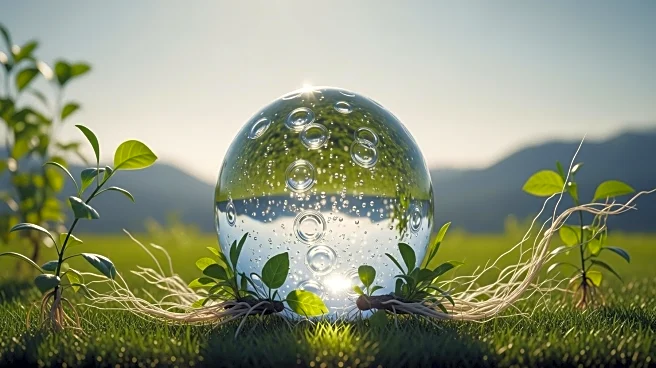What is the story about?
What's Happening?
A team of researchers from the Free University of Bozen-Bolzano and the Istituto Italiano di Tecnologia has developed a super-absorbent hydrogel designed for soilless farming, which enables plants to thrive in drought conditions. This biodegradable and eco-friendly hydrogel supports plant growth with minimal water usage and is capable of monitoring plant health in real-time. The innovation is part of a multidisciplinary project aimed at providing a zero-waste, low-environmental-impact solution for agriculture, addressing challenges such as climate change, drought, pollution, biodiversity loss, and soil degradation. The hydrogel is made from biopolymers, specifically carrageenan, a polysaccharide extracted from red algae, and enriched with whole-algae extracts that act as biostimulants. Tests have shown that the hydrogel can retain large amounts of water and support plant growth from seeds, demonstrating more vigorous growth compared to traditional hydroponic substrates.
Why It's Important?
The development of this hydrogel represents a significant advancement in sustainable agriculture, particularly in regions facing water scarcity and environmental degradation. By reducing water consumption and providing nutrients efficiently, the hydrogel offers a promising solution to enhance food security and promote environmentally friendly farming practices. The integration of biodegradable sensors into the hydrogel scaffolds further enables precision farming, allowing for real-time monitoring of plant health and soil conditions. This innovation not only addresses immediate agricultural challenges but also contributes to long-term sustainability goals by reducing reliance on petroleum-based materials and minimizing environmental impact.
What's Next?
The research team plans to continue refining the hydrogel's properties and explore its applications in various agricultural settings. Future developments may include the integration of advanced sensing technologies to further enhance precision farming capabilities. As the hydrogel technology progresses, it could be adopted by farmers and agricultural industries seeking sustainable solutions to combat climate change and improve crop yields. The researchers aim to expand the use of natural marine resources in materials engineering, potentially impacting other sectors such as packaging, water purification, and green electronics.
Beyond the Headlines
This innovation highlights the growing importance of interdisciplinary collaboration in addressing global challenges. By combining expertise in materials science, agriculture, and environmental sustainability, the project demonstrates how technological advancements can be leveraged to create solutions that are both effective and eco-friendly. The use of natural resources in engineering materials also underscores the potential for reducing dependency on synthetic and non-renewable materials, paving the way for more sustainable industrial practices.
















